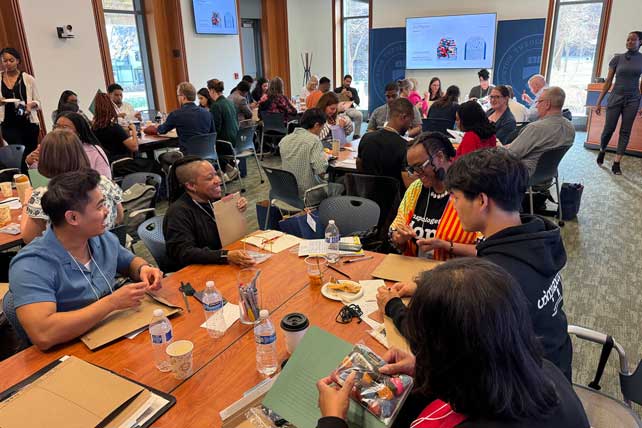“As the years went by, our churches grew healthier, they grew more intergenerational, they grew more missional, and this collaboration of churches shifted from individual churches to a network,” said the Rev. Daniel Hartman, co-director of Mosaic Ministries at Trinity Evangelical Divinity School.
In 2022, that network came together to form Refined, a program for young adults from each of the 12 churches. Across 18 months, the young adults received mentoring, attended retreats and became involved in Waukegan-based community projects.
Though Adi Camacho grew up attending a Baptist church in Waukegan, she joined Refined after several years away from the church.
“It was my first time getting to meet brothers and sisters who were not from my congregation that could hear my heart and be there for me and love and support me in such a godly way,” Camacho said. “We were able to break barriers between our churches.”
Children participate in a Waukegan community cleanup as part of Mosaic Ministries in Waukegan, Ill., in 2022. (Photo courtesy Mosaic Ministries)
Camacho hosts a podcast about Mosaic Ministries’ impact and pitches the program at citywide events like cleanup days, toy drives or prayer services. The city routinely looks to Mosaic to meet local needs, and Mosaic’s hub, a revamped former library, is a gathering place designed to welcome young people who might be hesitant to meet at church, said Hartman.
It’s not yet clear how Mosaic Ministries will be impacted by the seminary’s move. However, Mosaic and similar innovative seminary initiatives take a unique approach to empowering young people in their own contexts, without trying to convince them to enroll as students. For example, Austin Presbyterian Theological Seminary in Texas has created programming for both Christian and “Christ curious” young adults.
“There are all kinds of places where young adults gather at the edges of Christian conversation,” said Melissa Wiginton, vice president for strategic engagement and partnerships at the Austin seminary. “We know that there is a longing out there for people to be connected to something that’s sturdy enough to hold them, but not so rigid that it encages them.”
Since 2017, the seminary, also with the help of the Lilly Endowment, has created such spaces via its 787 Initiative, which offers faith and community engagement for young people in Austin. Mercedes Collins, who runs a recreational club, We Outside ATX, for Austin’s Black community, provides input for 787’s advisory council. She said young people in her network are craving spaces where their voices are heard.
“Community is a spiritual thing, right?” said Collins, who identifies as more spiritual than religious. “We’re not meant to be here alone.”
787 was a precursor to the seminary’s Austin Story Project, which launched in January and will offer an in-person storytelling cohort and spiritual pilgrimages for young adults. The first pilgrimage will focus on nonviolence, where participants will visit sites connected with nuclear weapon production in the Pacific Northwest. A survivor of the bombing of Hiroshima will accompany them.
“Everybody’s in a massive period of experimentation,” said Dean, of Princeton Theological Seminary. “Desperation is a spiritual gift, and so it gives you a chance to experiment with things that, you know, 10 years ago were off the table. That’s happening everywhere, and we are no different in that.”
Religion News Service receives funding from Lilly Endowment.
This article originally appeared here.


